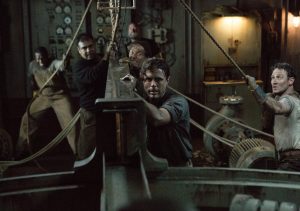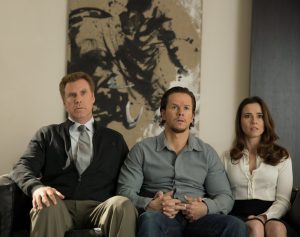
IMDb
David O. Russell has been enjoying something of a boom period as of late. His last three films—The Fighter, Silver Linings Playbook, and American Hustle—have all enjoyed considerable commercial and critical success. The trifecta has grossed more than $600 million altogether and has earned a running total of 25 Academy Award nominations, including nods in Best Picture and Best Director all three times, as well as a whopping 4 nominations apiece for the latter two. Regardless of your opinion of his work, it’s clear something he’s doing is working, and with the release of Joy, starring frequent collaborator Jennifer Lawrence, Russell doesn’t look like he wants to slow down anytime soon—for better or worse.
Lawrence stars as Joy Mangano, an inventor and businesswoman known for developing the Miracle Mop, an early success story of home shopping television. The film chronicles her meteoric rise to (and multiple near-falls from) fame and fortune. We get a brief prologue (delivered by Mangano’s grandmother, played by Diane Ladd) describing Joy’s childhood, defined mostly by a young Joy’s creative proclivities and strife from the divorce of her parents (played by Robert De Niro and Virginia Madsen). From there, the film goes on to show the stressful life Joy has been forced to manage, having to take care of both her parents and her two children from a failed marriage with Tony (Edgar Ramirez), until she, by chance, thinks up the idea for a self-wringing mop. She initially tries to market it on her own, but can’t find a foothold until she meets a television salesperson (Bradley Cooper), who opens up a new world of business to her.
It’s a fairly uncomplicated plot all the way through, but confusingly told. A notable feature of Russell’s films, and his post-“comeback” work in particular, is that they are never neatly constructed, always shot and edited in a fairly manic style, relying on the hysterics of the actors and wildly escalating situations. Sometimes, as in Silver Linings Playbook, this works to admirable effect. Other times, like in American Hustle, it doesn’t. Joy is mostly an improvement over that nearly-illegible fever dream of a crime drama, if only because there’s little to be confused about.
The film presents just about the most cut-and-dry rags-to-riches narrative possible—complete with a scene where Lawrence tearfully declares her dreams to be worthless only to appear in an elegant pantsuit not twenty minutes later. But so desperate for pizazz, Russell imposes strange frameworks on the movie that end up being more confusing than inspiring. Beyond just his now-trademark eccentric pacing, throwing in flashbacks at jarring moments and cutting scenes either before they seem to finish or long after, he decided to add in an occasional quirk where scenes play out, in dialogue, blocking, and framing, like a scene from a cheap soap opera to mimic the ones Joy’s mother watches. What this is supposed to accomplish is, frankly, beyond me—maybe the real drama was our own lives all along.
That said, Joy, like all of Russell’s other films, still has something worth admiring. Obviously, there’s Joy herself, Jennifer Lawrence, who is only now being given a true leading role by Russell, one of her top collaborators, and she makes the best of the opportunity, as her work here is at least the equal of her Oscar-winning turn in Playbook, and certainly more compelling than her follow-up role in Hustle. She plays Joy with a certain sense of beaten-down-ness with a hidden iron resolve that recalls her breakout work in Winter’s Bone, though with a frequently visible vulnerability that most of her prior roles haven’t allowed her. It’s not a terribly flashy role in practice, but maybe that’s all the better—Lawrence, despite her very forward and expressive public persona, frequently does her best work where she’s allowed her moments of quiet and subtlety, be it in Winter’s Bone or even The Hunger Games. Here, she’s given plenty of opportunity to do that, though she still has time for Russell-branded histrionics—something that she’s also shown a talent for.
This marks the third film in a row where Russell has collaborated with Lawrence as well as Cooper and De Niro, forming, for now, a neat little triptych of Russell-isms that are interesting to observe. Playbook was the intro, quirky but easy to go along with, fueled with charming performances and a convenient cover for Russell’s frantic stylings found in its main character’s bipolar disorder. Hustle was the indulgent follow-up, attempting to do far too much and ultimately doing little of it well, crushed by its own frilly ambition but arguably admirable in its spunk and energy nonetheless. Joy, then, is the more level-headed entry, trying to show that Russell can do more than rom-coms and star-studded heist-comedy-things.
He’s not entirely successful, not only because it’s messy and somewhat pretentious, but it’s also just pretty boring. Russell’s at his best when he’s shooting along the fine line between fast-paced dramedy and incomprehensible frenzy, but here he’s trying to stay too conventional too often, holding back his jitters except when it’s least convenient. It may also have to do with underutilizing Bradley Cooper, the one who, with all respect to Jennifer Lawrence, may be the most qualified to bring Russell success—as with his laugh-out-loud scenes with Louis CK in Hustle, his pair of scenes directing a QVC sales pitch are easily the best in the film, capturing a sort of easy grandeur that Russell can’t seem to tap into for much of the rest of the film.
Russell is a frustrating filmmaker to follow, mostly because he always seems to just miss out on making a better film. This is the case with Joy. He has all the ingredients for a quality film: great performers, a clever but accessible premise, and a committed desire to entertain. However, he seems to both try too hard and not hard enough, attempting to work in obtuse narrative devices while not paying attention to make sure individual scenes and plot threads play out smoothly. If this is Russell’s attempt at demonstrating a mature sensibility, he’s working against himself. He put out a film that has all the same problems as his others: a good show for the actors, but not much of a story.






Great review! I really enjoyed it. (Though I would’ve enjoyed it more had you not used the word “beaten-down-ness.”)